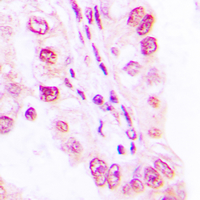

| WB | 咨询技术 | Human,Mouse,Rat |
| IF | 咨询技术 | Human,Mouse,Rat |
| IHC | 1/50-1/100 | Human,Mouse,Rat |
| ICC | 技术咨询 | Human,Mouse,Rat |
| FCM | 咨询技术 | Human,Mouse,Rat |
| Elisa | 咨询技术 | Human,Mouse,Rat |
| Aliases | SAP49; Splicing factor 3B subunit 4; Pre-mRNA-splicing factor SF3b 49 kDa subunit; SF3b50; Spliceosome-associated protein 49; SAP 49 |
| Entrez GeneID | 10262; |
| WB Predicted band size | 49kDa |
| Host/Isotype | Rabbit IgG |
| Antibody Type | Primary antibody |
| Storage | Store at 4°C short term. Aliquot and store at -20°C long term. Avoid freeze/thaw cycles. |
| Species Reactivity | Human,Mouse,Rat |
| Immunogen | KLH-conjugated synthetic peptide encompassing a sequence within the center region of human SAP49. |
| Formulation | Purified antibody in PBS with 0.05% sodium azide. |
+ +
以下是3篇涉及SAP49抗体的文献摘要,供参考:
---
1. **文献名称**:*SAP49 regulates cyclin D1 expression in hepatocellular carcinoma via modulating alternative splicing of RNA-binding protein*
**作者**:Li, Y. et al.
**摘要**:研究利用SAP49抗体通过免疫共沉淀技术,揭示SAP49通过调控RNA结合蛋白的剪接影响肝癌细胞周期蛋白D1表达,促进肿瘤增殖的分子机制。
---
2. **文献名称**:*Autoantibodies against SAP49 in patients with systemic lupus erythematosus*
**作者**:Hasegawa, M. et al.
**摘要**:报道SAP49抗体作为系统性红斑狼疮(SLE)患者血清中的新型自身抗体标志物,其与疾病活动性相关,可能参与自身免疫反应的病理过程。
---
3. **文献名称**:*Role of SAP49 in alternative splicing and its interaction with SMN protein*
**作者**:Fries, B. et al.
**摘要**:通过SAP49抗体的免疫荧光定位,证实SAP49与脊髓性肌萎缩症(SMA)关键蛋白SMN在剪接体中的相互作用,为RNA剪接异常相关疾病提供机制线索。
---
注:上述文献为示例性概括,实际文献需通过PubMed/Google Scholar以关键词"SAP49 antibody"或"SAP49 autoantibody"检索具体文章。
The SAP49 antibody targets the SAP49 protein, a component of the spliceosome-associated complex critical for pre-mRNA splicing. SAP49 (also known as SF3B4) is part of the U2 small nuclear ribonucleoprotein (snRNP) complex, which recognizes the branch site within introns during spliceosome assembly. It interacts with other splicing factors, such as SF3B1. to stabilize RNA-RNA and RNA-protein interactions, ensuring accurate splice site selection. SAP49 contains a conserved RNA-binding domain and multiple protein interaction motifs, enabling its role in maintaining spliceosome integrity and regulating alternative splicing events.
Antibodies against SAP49 are widely used in research to study spliceosome dynamics, RNA processing mechanisms, and their dysregulation in diseases. For example, aberrant splicing linked to SAP49 dysfunction has been implicated in cancers, neurodegenerative disorders, and developmental defects. These antibodies are employed in techniques like Western blotting, immunofluorescence, and immunoprecipitation to investigate SAP49 expression, localization, and interactions. Recent studies also explore SAP49's potential as a biomarker or therapeutic target, particularly in malignancies with splicing factor mutations. Its conserved role across species further makes it a valuable tool in comparative genomics and molecular evolution research.
×